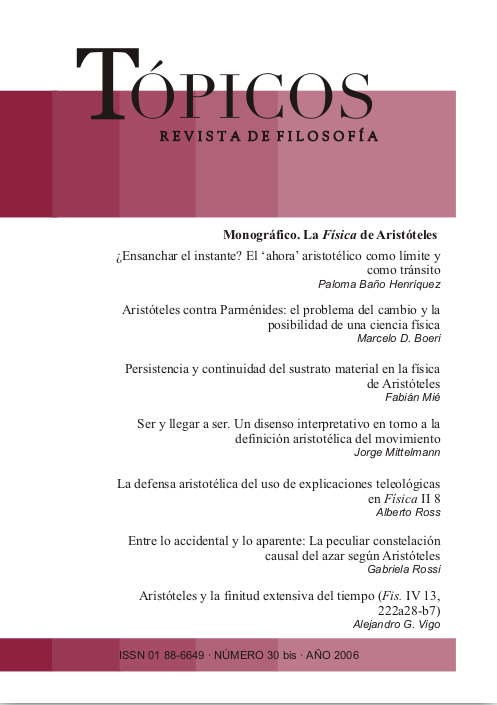Publicado 2013-11-28
Palabras clave
- Aristóteles,
- Física,
- tiempo,
- infinitud,
- movimiento.
Cómo citar
Resumen
Este ensayo se centra en un breve pero significativo pasaje de Física, IV 13, 222a28-b7, en el que Aristóteles provee dos argumentos a favor de la infinitud extensiva del tiempo. El primero, argumenta Vigo, presenta su infinitud extensiva como dependiente de la infinitud del movimiento. El segundo argumento, en cambio, procede inmanentemente a partir de la consideración de las propiedades que el ‘ahora’ posee como límite que da cuenta tanto de la posibilidad de la delimitación (divisibilidad) como de la continuidad del tiempo. El artículo también examina algunas consecuencias sistemáticas de este último argumento e intenta aclarar algunos acertijos que involucra desde el punto de vista metodológico. Tales dificultades subrayan algunos límites estructurales del intento de Aristóteles por llevar a cabo un tratamiento re(con)ductivo de las propiedades del tiempo consideradas como un modo del continuum dependiente de otros dos dominios más básicos: el movimiento y la magnitud espacialmente extensa.
Descargas
Referencias
- Alejandro de Afrodisia. (1881). In Aristotelis Metaphysica Commentaria. M. Hayduck (ed.) Berlin.
- Algra, K. (1995). Concepts of Space in Greek Thought. Leiden, New York y Köln.
- Aristóteles. (1936). Physics. W. D. Ross (ed.) Oxford.
- ____ (1983). Physics, Books III-IV. Oxford.
- ____ (1993). La Metafisica. Vols. 3. Milano.
- ____ (1995). Física, Libros III-IV. A. G. Vigo (trad.) Buenos Aires.
- ____ (1999). Physics, Book VIII. D. Graham (trad.) Oxford.
- ____ (2003). Física, Libros VII-VIII. Buenos Aires.
- Becker, O. (1927). Mathematische Existenz. En Jahrbuch für Philosophie und phänomenologische Forschung. Vol. 8. Tübingen.
- Bergson, H. (1927). Essai sur les données immédiates de la conscience. Paris.
- Böhme, G. (1974). Zeit und Zahl. Studien zur Zeittheorie bei Platon, Aristoteles, Leibniz und Kant. Frankfurt.
- Corish, D. (1976). The Concepts of Space and Time. Their Structure and their Development. Dordrecht-Boston.
- Cornford, F. M. (1936). The Invention of Space. En The Concepts of Space and Time. Their Structure and their Development. M. Čapek (ed.) (3-16). Dordrecht-Boston.
- Fraassen, B. C. (1970). An Introduction to the Philosophy of Time and Space. New York.
- Kant, I. (1787). Kritik der reinen Vernunft. J. Timmermann und H. Klemme (ed.) Hamburg.
- Heidegger, M. (1927a). Die Grundprobleme der Phänomenologie. W. F. Von Hermann. Frankfurt.
- ____ (1986). Sein und Zeit. 7ma ed. Tübingen.
- King, H. R. (1950). Aristotle’s Theory of Topos. En Classical Quarterly, 44: 76-96.
- Kosman, L. A. (1969). Aristotle’s Definition of Motion. En Phronesis, 14: 40-62.
- Lear, J. (1979-1980). Aristotelian Infinity. En Proceedings of the Aristotelian Soociety, 80: 187-210.
- Owen, G. E. L. (1979). Aristotle on Time. En Articles on Aristotle: Metaphysics. Vol. 3. J. Barnes, M. Schofield and R. Sorabji (eds.) (140-158). London.
- ____ (1986). Logic, Science and Dialectic. Collected Papers in Greek Philosophy. M. Nussbaum (ed.) Ithaca.
- Robin, L. (1908). La théorie platonicienne des Idées et des Nombres d’après Aristote. Hildesheim.
- Sorabji, R. (1988). Matter, Space and Motion. Theories in Antiquity and their Sequel. Ithaca.
- Simplicio. (1882). In Aristotelis Physicorum Libros Quattor Priores Commentaria. H. Diels (ed.) Berlin.
- Temistio. (1900). In Aristotelis Physica Paraphrasis. H. Schenkl (ed.) Berlin.
- Torretti, R. (1998). Space. En Routledge Encyclopedia of Philosophy. E. Craig (ed.) (59-70). London and New York.
- Vigo, A. G. (1990). Orden especial y orden temporal según Aristóteles (Fís. IV 11, 219a10-21). En Méthexis, 3: 65-83.
- ____ (1999). Homonimia, explicación y reducción en la Física de Aristóteles. En Thémata, 21: 197-218.
- Wieland, W. (1962). Die aristotelische Physik. Untersuchungen über die Grundlegung der Naturwissenschaft und die sprachlichen Bedingungen der Prinzipienforschung bei Aristoteles. Göttingen.
- ____ (1972). Zeitliche Kausalstruckturen in der aristotelischen Logik. En Archiv für Geschichte der Philosophie, 54 (3): 229-237.






